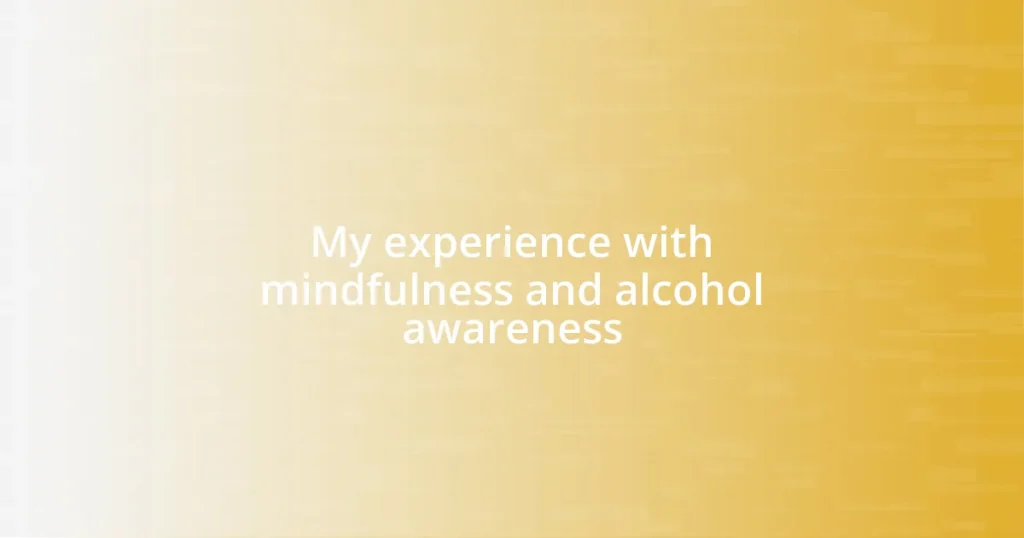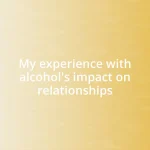Key takeaways:
- Mindfulness practice transforms daily living by promoting awareness of thoughts and feelings, leading to stress management and improved responses to life’s challenges.
- Identifying triggers for alcohol consumption reveals the impact of social situations, emotional states, and relationships on drinking habits.
- Mindfulness strategies, such as mindful eating, journaling, and practicing gratitude, support healthier attitudes toward alcohol and enhance overall well-being.
- Building healthy coping mechanisms through physical activity, creative outlets, and community connection fosters resilience and replaces reliance on alcohol for comfort.
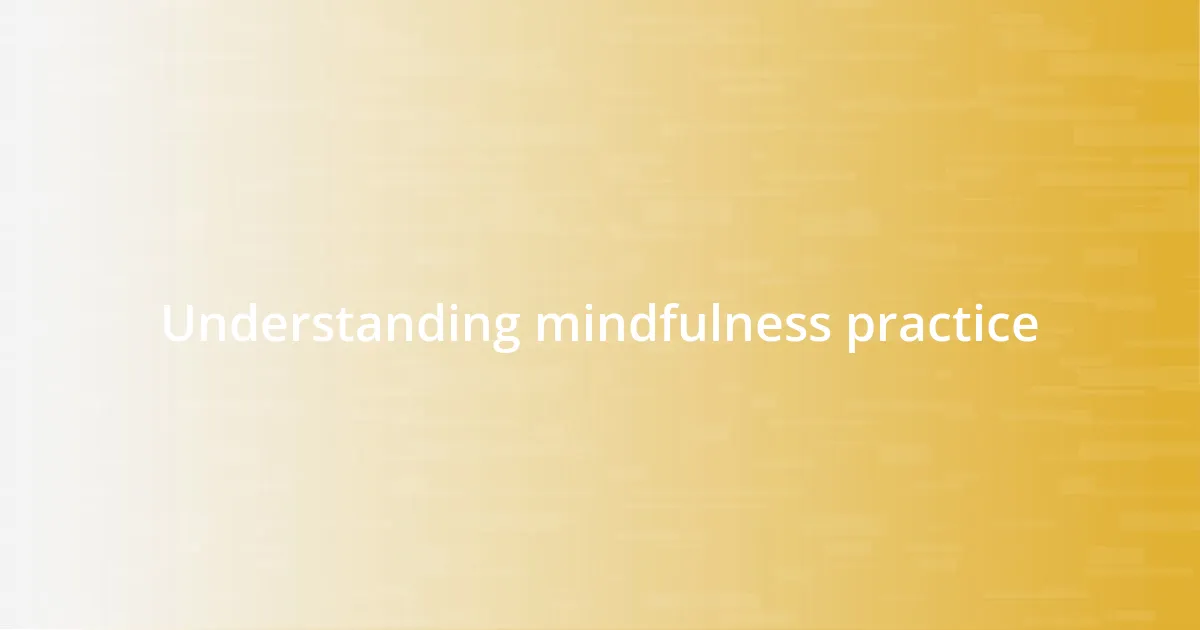
Understanding mindfulness practice
Mindfulness practice is about being fully present in the moment, which I found transformative. Picture this: I often caught myself lost in thoughts about the day ahead or reflecting on past mistakes, but when I started incorporating mindfulness, that chaotic noise quieted. Have you ever noticed how simply paying attention to your breath can ground you in the midst of a busy day?
One of my favorite exercises involves focusing on my surroundings, letting go of judgment. I remember sitting in a park, observing the way the leaves danced in the wind, and it struck me how much beauty I’d overlooked. It made me wonder, what else in my life had I been missing while I hurried through my routine?
In my journey, I’ve recognized that mindfulness isn’t just a practice; it’s a lifestyle change. It invites us to notice our thoughts and feelings without attachment, which I found particularly useful in moments of stress. There’s a certain freedom in realizing that not every thought or feeling deserves our reaction. Isn’t it liberating to think we can step back and choose how we respond?
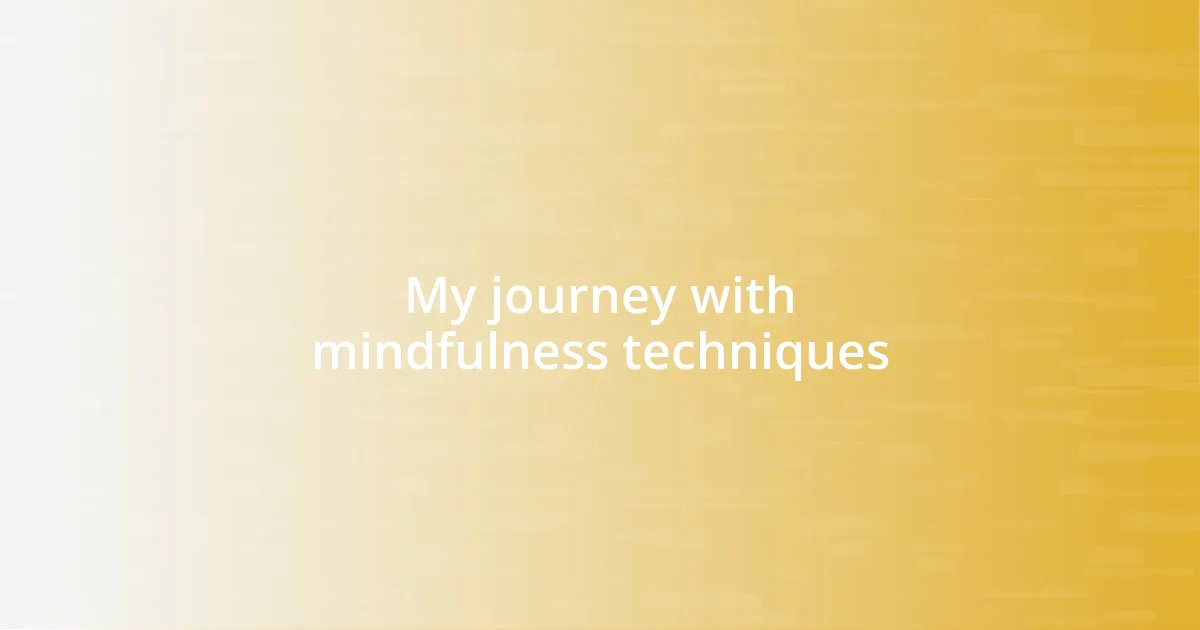
My journey with mindfulness techniques
In my journey with mindfulness techniques, I began to understand the significant impact of daily rituals. One practice that resonated deeply with me was starting each morning with a few moments of breath awareness. As I sat on the edge of my bed, focusing on my breath, I felt the weight of yesterday’s worries dissipating. It was in those quiet minutes that I realized how much clarity I could carry into my day.
- I made it a habit to pause before reaching for my phone each morning.
- I dedicated ten minutes to mindful walking, paying attention to how my feet connected with the ground.
- I tried journaling my thoughts, capturing my feelings without judgment, allowing me to witness my emotions as they unfolded.
Gradually, these practices intertwined into my daily routine, transforming my perception of life’s challenges. I vividly recall one particularly stressful afternoon when I felt overwhelmed with work. Instead of succumbing to anxiety, I paused to perform a simple body scan, focusing on each part of my body to release tension. In that moment, my stress morphed into a gentle reminder of the present, allowing me to approach my tasks with renewed vigor and a sense of peace. This journey taught me that mindfulness is a bridge to self-awareness, helping me navigate life’s storms more gracefully.
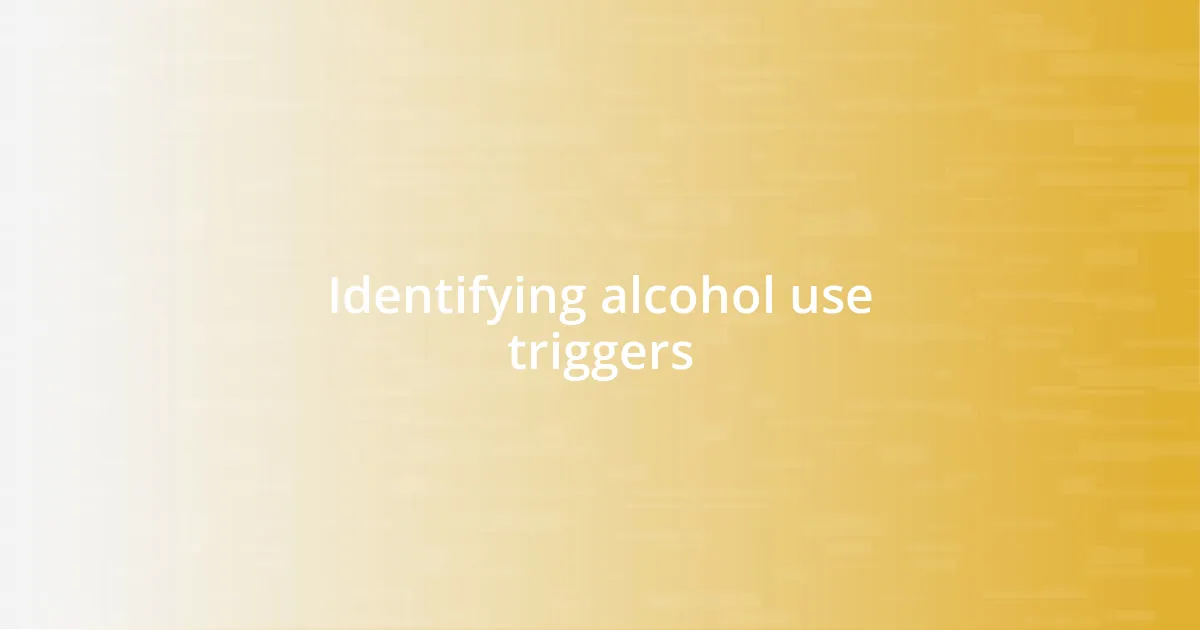
Identifying alcohol use triggers
Identifying alcohol use triggers can be quite revealing. From personal experience, I’ve discovered that certain environments, like social gatherings, can unknowingly nudge me towards reaching for a drink. I remember attending a friend’s birthday party, where the lively atmosphere pulled me in, making it hard to resist the temptation of a celebratory toast. Reflecting on those moments, I learned that recognizing these triggers isn’t just about avoiding them, but understanding why they have such a magnetic pull.
I’ve also noticed that my emotional state plays a significant role. For instance, after a particularly stressful day at work, my mind would wander to the idea of unwinding with a drink. Have you ever found yourself associating relaxation with alcohol? It’s a common connection, but mindfulness has helped me pause and ask myself if a drink is truly what I need for comfort. Instead, I opted for a calming herbal tea. That small act brought about a profound shift in how I view stress relief.
Lastly, my relationships have shaped my triggers in unexpected ways. I’ve had friends who often encouraged a “cheers” moment during our get-togethers, assuming everyone would want to drink. In one memorable instance, I expressed my intention to stay sober during a gathering. What surprised me was the support I received instead—many admired my decision. It made me realize that sharing my journey can transform how others engage, fostering a healthier atmosphere.
| Trigger Type | Description |
|---|---|
| Social Settings | Parties or gatherings can amplify the urge to drink due to peer influence. |
| Emotional States | Stress or anxiety may lead to seeking comfort in alcohol as a coping mechanism. |
| Relationships | The reactions of friends can shape drinking behaviors, sparking either support or temptation. |
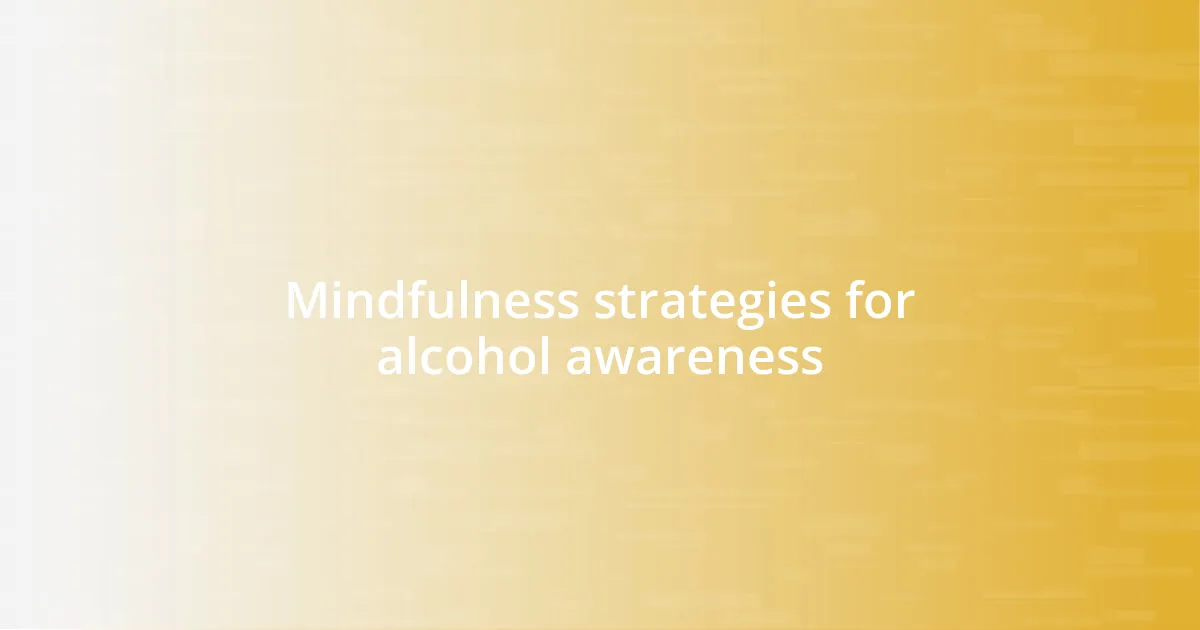
Mindfulness strategies for alcohol awareness
Mindfulness strategies can profoundly transform how we approach our relationship with alcohol. One of my go-to techniques is mindful eating, which may sound unrelated, but it really isn’t. When I savor my meals, I cultivate an awareness that spills over into my drinking habits. Instead of mindlessly pouring another glass, I find myself pausing to ask, “Am I really thirsty, or is this just habit?” This practice has helped me listen to my body’s signals, ensuring that I respond to true needs rather than automatic behaviors.
Journaling has been another powerful tool in my mindfulness toolkit. Through regular reflection, I connect with my thoughts and feelings surrounding alcohol consumption. I still remember a particular evening when I scribbled down my day’s emotions in a notebook. I realized how many of my drinking moments coincided with feelings of loneliness or boredom. Have you ever noticed how powerful emotions can lead us to the bottle? By digging deeper in my journal, I uncovered triggers that were subtle yet impactful, allowing me to seek alternative ways to find joy and connection.
Lastly, practicing gratitude has shifted my perspective significantly. I began a nightly ritual where I list three things I’m grateful for, often focusing on moments that don’t revolve around alcohol. One evening, I found immense joy in simply listing small pleasures—a beautiful sunset, laughter shared with a friend, or a great book. This practice helped me see that fulfillment comes from many sources, not just a drink in hand. How often do we forget to appreciate what truly feeds our happiness? Mindfulness can guide us to recognize that there’s a world of joy waiting beyond the clink of glasses.
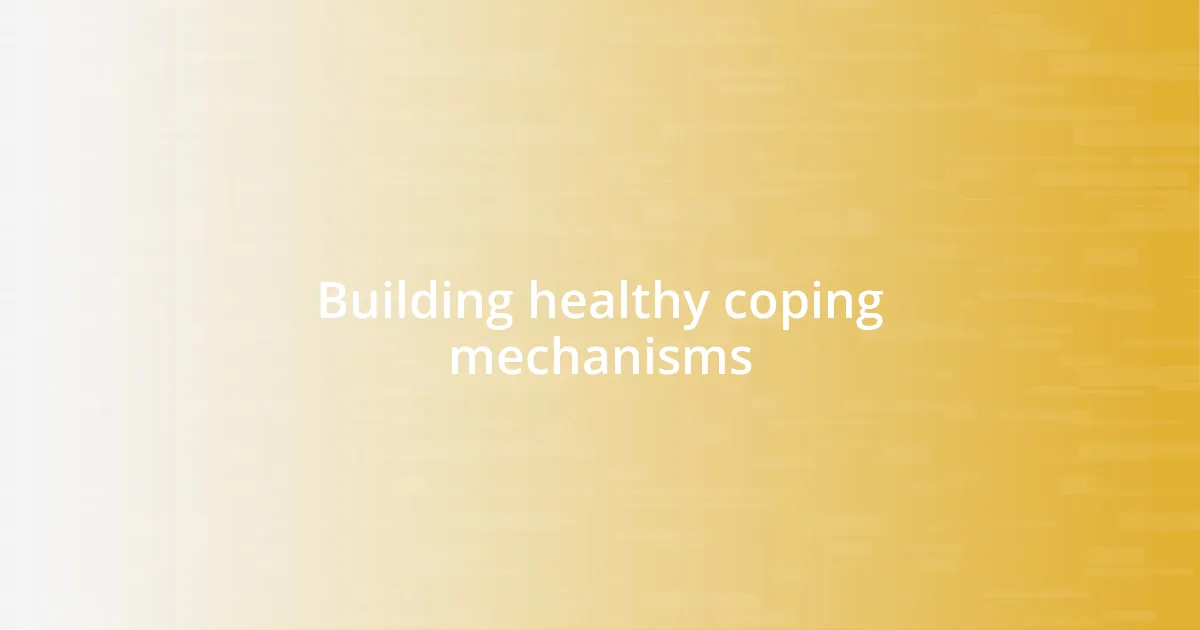
Building healthy coping mechanisms
Building healthy coping mechanisms is a journey that requires intention and self-discovery. One approach that has worked wonders for me is substituting my usual responses to stress with physical activities. For example, on one particularly challenging day, instead of heading to the bar, I reached for my running shoes. As I ran through the neighborhood, the rush of endorphins and the clear air reinvigorated my mind and spirit. Have you ever noticed how a good workout can change your mindset? Physical activity can be an uplifting remedy, one that quietly replaces the allure of a drink.
I also found that developing a creative outlet has been invaluable. Painting, writing, or even cooking became my escapes, allowing emotions to flow into something tangible. I distinctly remember losing track of time while trying to capture a sunset on canvas. That immersion provided me with a sense of accomplishment and peace. Can you think of a hobby that allows you to immerse yourself fully, removing thoughts of alcohol distraction? Engaging with creativity fosters a natural high that helps fill emotional voids.
Lastly, there’s a powerful aspect of building healthy mechanisms through connection. I’ve joined a local book club, which serves not just as a social gathering, but a place of shared understanding and support. We often discuss topics around mental health and coping strategies, creating an environment where vulnerability is welcomed. Have you ever felt the strength of community in your journey? That sense of belonging has transformed my approach, reinforcing that I’m not alone in my experiences and encouraging healthier coping mechanisms among peers.
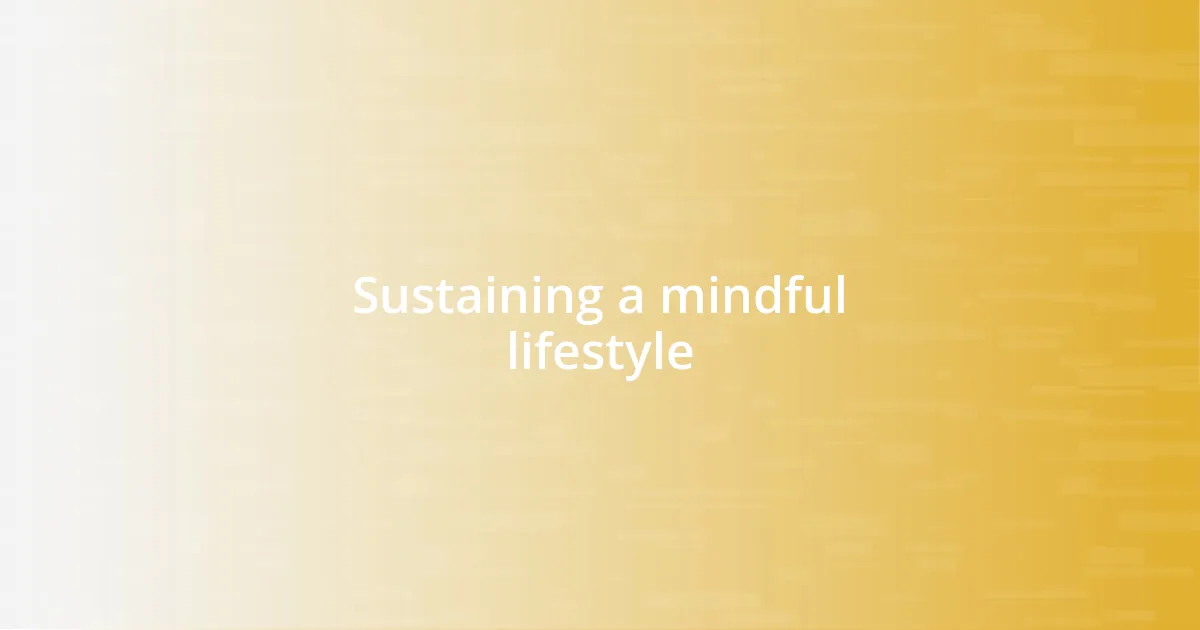
Sustaining a mindful lifestyle
Sustaining a mindful lifestyle demands constant attention and intention. I remember a weekend retreat where we practiced mindfulness meditation every morning. It was transformational; I realized how easily distractions can derail my day. When I consciously redirected my focus, I noticed it wasn’t just my meditation session that improved, but my entire interaction with the world—especially when it came to choosing how I unwind in the evenings. Have you ever felt the difference in your mindset after a focused meditation?
Integrating mindfulness into my daily routine means being present in small moments. I often find myself taking a few deep breaths before meals or whenever I reach for a drink, allowing myself to pause and reflect. Just yesterday, as I stood in the kitchen, the smell of my herbs and spices filled the air, and I thought about the choices I had made that day. Instead of reaching for my usual glass of wine out of habit, I made a herbal tea instead. It’s refreshing to realize that these simple acts of mindfulness can reshape my evenings from routine to nourishing.
What I have found most revealing is how awareness shapes my relationships, too. I recall a friend’s birthday party where the atmosphere buzzed with excitement, and drinks flowed freely. In the past, I would have matched that energy with careless indulgence. Instead, I chose to engage deeply in conversations and savor the energy in the room without relying on alcohol. How often do we miss the essence of life’s celebrations when we’re focused on the glass in our hand? Staying mindful allowed me to forge better connections and enjoy the experience fully, reminding me that being present often offers more fulfillment than a quick sip ever could.










